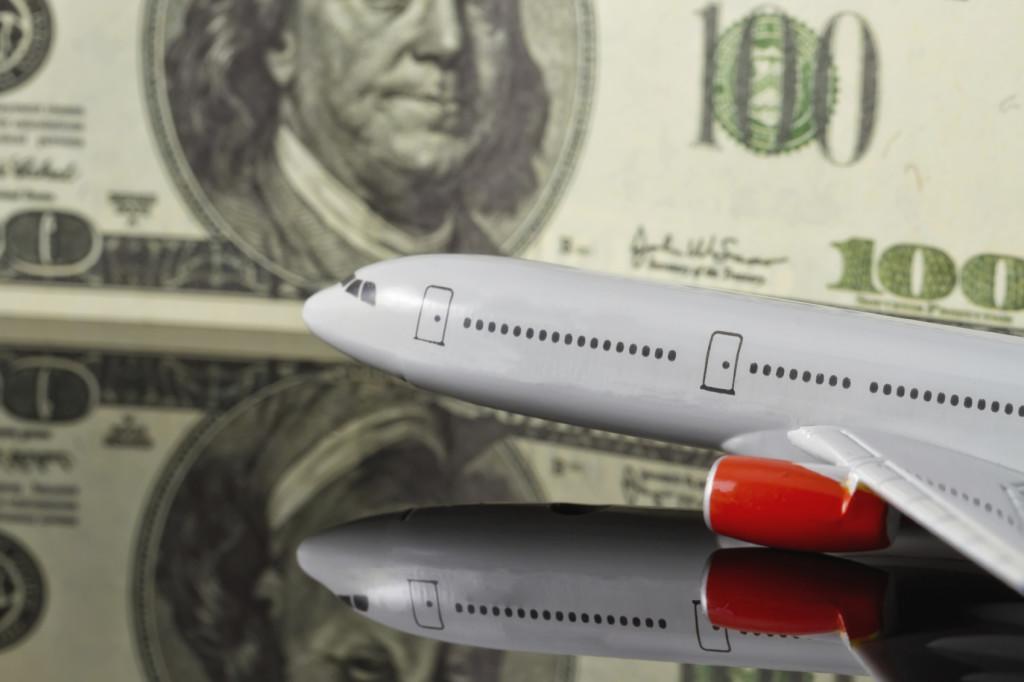Mysterious Fees Imposed by Carriers Leave Passengers Confused

Concept :rise of freight and passenger traffic in the world. Figure the plane on the background of hundred-dollar bills.
Originally levied as fuel surcharges, airlines began imposing their own additional fees a decade ago. While industry regulation has ensured that these fees can no longer be referred to as “fuel surcharges,” it’s not quite clear what these mysterious – and highly variable – charges are for.
Even the most clued-up of travelers can struggle to decode the pricing of their plane tickets. Various add-ons contribute to the final cost, but, what’s not always clear, explains the Wall Street Journal, is the breakdown of fees imposed by carriers upon their passengers.
These fees, which the outlet reports were initially imposed a decade ago as fuel surcharges, are often rolled into government taxes.
However, these charges, writes the outlet, are “truly arbitrary.” While they aren’t related to the distance traveled, these surcharges can “vary wildly by direction of travel.” In some cases, they can add up to more than the base fare and are subject to market fluctuations.
Citing two examples, the outlet reports that, “A $638 Virgin Atlantic round trip between New York and London breaks down to a fare of only $93, a carrier-imposed surcharge of $320 and government taxes of $225. A British Airways basic economy ticket lists the fare at $13 and “taxes, fees and carrier charges” at $545 for a total of $558.”
Because of industry regulation, carriers can’t describe these mysterious fees as “fuel surcharges,” but it’s not always evident what these charges are for.
“Some carriers have said the surcharges partially cover costs beyond the company’s control … A curious traveler has to drill down to see the breakdown between airline charges and government or airport assessments. It’s not always obvious that an ‘international surcharge’ goes to the airline,” reports the outlet.
But many carriers don’t provide clarity as to the breakdown of these fees and this lack of transparency leaves passengers none the wiser.
These fees have been common among European carriers for years, but airlines like American, Delta and United have been reticent to take up their enforcement. However, things are slowly changing in the U.S., with many now beginning to tag them on to the purchase price.
Commenting on the uptake of this practice, Jay Sorensen, a frequent-flier program consultant and president of Wisconsin-based IdeaWorks Co., said, “I look upon these as loyalty killers. They grease the bottom line, but they have a chilling effect on loyalty.”
[Photo: Shutterstock]
























Air fares are taxed, surcharges are not. Hence, the airlines are getting away by not collecting taxes for the government and pocketing the funds for themselves.
...reading this and the following comments it sounds as if the US went back to regulated skies where the Government set fares on flight mileage and fuel costs (particularly considering how efficient aircraft have become in the last 50 years) we would be better off as fares would be standardised and we may see a resurgence of a more linear route structure again. Airlines are still subsidised by taxes, through the FAA (ATC and enroute control) as well as local municipal/county governments which build and maintain airport facilities. It is ridiculous that someone flying from Portland to Montana has to pay almost an equivalent (sometimes even higher) fare than someone travelling from say, LA to Chicago or Atlanta because fares are based on a city pair market, not miles travelled. So in effect that passenger on the shorter flight is subsidising the one on the longer trip.
Miles and More fees vary by carrier, the worst offender is Lufthansa. The most reasonable is SAS (but don't expected complementary drinks). For this reason, I don't elect to have miles credited to M&M. Turkish Air is also an offender in that any discount they offer (i.e. 15% first time app bookings) only applies to a portion of the total ticket charge. Plus Miles and Smiles miles are impossible to book. I believe so called Fuel Surcharges are totally at the determination of that specific airline. United, for all it's faults, doesn't charge any.
Their main function is to make award tickets more expensive. If you're purchasing a fare, it doesn't matter what the various components are called. But when redeeming miles, these get added in and go straight to the airline's bottom line.
When booking with Emirates I could see the fare breakdown. I bought a ticket in J from VCE to AKL carrier imposed charges are 932 Euro, taxes and fees 83, fare 2860. It used to be fuel surcharge 700. I never claim an award ticket, I prefer upgrading. Miles and More usually charges me at least 700 euro for an award flight.